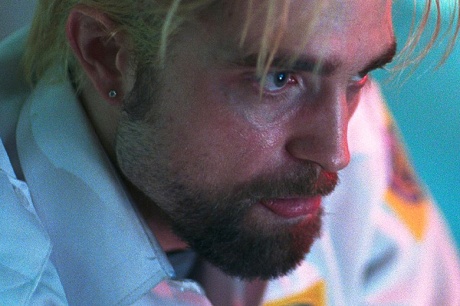A24 does it again. Let me just state that if you see the A24 logo at the start of a movie, it will be worth your time.
Here’s a list of films A24 had produced: Lady Bird, The Disaster Artist, The Killing of a Sacred Deer, The Florida Project, A Ghost Story, It Comes at Night, 20th Century Women, Moonlight, Swiss Army Man, The Lobster, Green Room, The VVitch, Room, Amy, Ex Machina, A Most Violent Year, Locke, Under the Skin, Enemy, Spring Breakers.
That is a cherry-picked list of fascinating movies they have made…..since 2013. Those movies may not be for everyone, but I can assure you there are themes, performances, writing, and directing worth checking out in every single one of them.
For anyone tired of formulaic cinema, keep an eye on what A24 is doing.

Which brings me to the latest film of theirs I’ve seen, Good Time. Directed by Josh and Bennie Safdie (the latter of which plays a main character, as well as having an editing credit) and starring Robert Pattinson in a performance that should be taken note of this awards season. The film is essentially about family, but in the most twisted and depraved way possible.
Bennie Safdie plays Nick Nikas, the mentally handicapped brother to Pattinson’s Connie Nikas, who goes along with a bank robbing scheme that goes wrong. Unlike a typical heist drama that would spend the rest of the film working out schemes for the heroes to escape their situation, Good Time uses the outcome of the robbery to pull away the facade of the brotherly bond Connie fights so hard to keep and show how villainous that passion can be.
Very early in the film Connie makes it clear to Nick that they are a family of two; a bond that other people couldn’t possibly understand and doesn’t include their grandmother, who is portrayed to be a negative influence on the brothers. Nick is enrolled in a
program to enrich people with mental handicaps at the start of the film, a program which Connie vehemently disagrees with and promptly, and violently, removes his brother from in order to enact his robbery scheme with the dream of leaving the city and buying a farm.
On the outside, Connie’s love and devotion to his brother is empathetic: he is family and he knows what is good for Nick.
Then comes the heist. And the aftermath where Nick gets arrested but Connie escapes, and then the real schemes begin.

The rest of the story moves along at a fever-pitch with nightmarish tension, induced with terrific use of synth music and an ever-close camera that expertly displays Connie’s emotion and vacuous desperation to retrieve his brother, but also his insanity and his inevitable fate.
The film excels because it is based on character action and decision. Too often we learn about characters through exposition and garrulous monologues explaining intent and purpose, but Connie Nikas only says what he has to say in order to achieve his goal. His modus operandi is creating an advantage for himself, whether it’s a person or an object, or simply timing, but his goal is to help his brother and it’s that dialectical action that shapes him into a fully formed person. The character is a user, but it comes off almost charming because of the manic, impassioned performance by Pattinson. You believe he is doing what is in the best interest of his brother, but you are horrified by the path he takes to get there.
The character works so well because Pattinson’s performance is dialed-in. He plays Connie like the opposite side of two magnets trying to come together. He is desperately trying to be connected to his brother, but everything he does causes a negative reaction and results in more distance between the two. His struggle is noble, but the path he carves has no room for survivors, including himself.
He is seemingly fearless in his actions but the inevitable outcome of his actions and decisions are evident to the viewer, and you have to believe even Connie knows things aren’t going to come out rosy. Breaking his brother out of a hospital bed guarded by an armed police officer is a decision he makes in a blink, and he manages to succeed with what appears to be deft maneuvering and a well thought out escape plan. But that’s not the case.
The breakout doesn’t succeed because Connie has a master plan and his will to accomplish it is indomitable. He accomplishes it to demonstrate to us that his life is, essentially, fucked. Every decision and half-baked scheme has a sympathetic purpose: to break his brother out of prison and get him somewhere safe. What we realize through the course of a nightmarish night filled with unfortunate characters living in destitute situations is that Connie is the last thing Nick needs in his life. Connie is the problem.
The film is a worthy addition to any heist movie collection, and in fact, it belongs near the top. Few heist films feature a plot so feverishly paced that, in essence, every scene is a different sort of heist and increases the viewers heightening sense of dread. Where the film truly succeeds is in it’s willingness to let the action play out without explanation. There are no less than a dozen different schemes played out in this film and not once does the character stop to explain what is happening.
When was the last time we had to use our brain and actually watch to enjoy the story?
The Safdie brothers are to be commended. Check this film out.